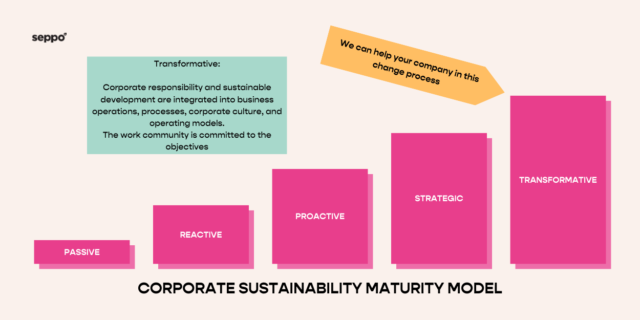Why employees should be involved in the company’s sustainability work?
Why employees should be involved in the company’s sustainability work?
Today, every company has to think about how responsibly it operates. A sustainable business may be built into a company’s DNA, but there are also increasing expectations from different reference groups, customers, and authorities.
During the first part of this year, I met several sustainability directors from companies of all sizes and people who consult companies on ESG (Environmental, Social, Governance) issues. One major challenge has clearly emerged from these discussions: how to involve employees in building a responsible business.
In many companies, sustainability issues are still “in the process”.
Most progressive companies have a sustainability director, and sustainability is part of the strategy work of the management team. For some years now, large listed companies have been reporting on their own ESG processes with the help of consultancy firms. In most cases, the services of consultants are terminated once the company has completed its corporate responsibility programme. After that, companies are left to deal with the issue on their own. The risk is that the sustainability strategy takes on a life of its own and employees are unaware of it. However, real change is only possible if everyone in the organisation is involved in implementing the sustainability programme.
It is easy for those who are familiar with the issue to talk about sustainability in top-level terms. Sustainability jargon includes ESG, DEI, SDG, CSRD, inclusion, diversity, etc. How many of the people working in a company really know what sustainability means in practical terms?

Why is reporting alone not enough?
Corporate responsibility is monitored from three different angles. ESG is about managing a company’s environmental, social, and governance responsibilities. The importance of corporate responsibility has grown exponentially in recent years, particularly in the face of accelerating climate change. Equality, human rights, respect for diversity, and fairness are also perceived as increasingly important global values. Engaging staff in the implementation of sustainability objectives is important to make a real difference. A mere lecture held but the CEO is not enough to engage employees in the change. Here are three reasons why it pays to involve employees in a concrete way in the sustainability agenda.
- Efficiency and genuine change. Changing the DNA and culture of a company cannot be achieved without the involvement of employees. Once they are committed to the company’s goals, they can help identify opportunities and areas for development that the company can further develop to achieve its ESG objectives.
- Relevance and brand. When employees feel part of a company’s corporate social responsibility, it enhances its reputation and brand. This attracts potential customers and employees who share the same values and ESG objectives.
- Employee experience. Employee engagement increases motivation and commitment to work. When employees see that their contribution has a positive impact on the environment, society, and corporate social responsibility, it increases work motivation, employee satisfaction, and commitment to the company.
At the forefront or behind?
According to a survey commissioned by Suomen Asiakastieto, more than 98% of Finnish companies are committed to working towards Finland’s carbon neutrality target. This is a tough target and therefore employees need to be engaged in achieving it.
Where is your company in the development process?
Gamification is an effective, fun, and efficient way to boost sustainability. Using gamification can reduce employee resistance to change or enhance the experience of relevance, depending on where companies are in the ESG change process. Gamification helps to translate abstract issues into practical action.
The Seppo gamification platform makes it easy to build a learning game tailored to each company’s context, combining high-level objectives with concrete, practical choices. We have been implementing several projects to embed sustainability programmes in companies of different sizes with excellent results. Let us tailor a game to your needs to help you turn sustainability objectives into practical action.
Writer:
Riku Alkio – CEO and Founder of Seppo
If you are interested in hearing more about how we at Seppo can help your company with ESG communication, contact our team at info@seppo.io
Read more about the topic on our website or download our Gamification in DEI: The Golden Nugget? whitepaper